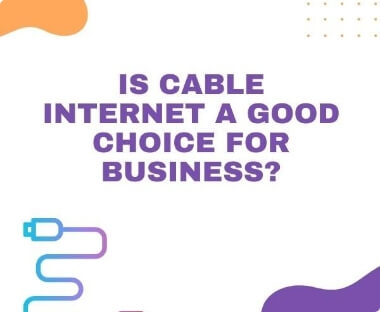Is Cable Internet a good choice for my business?
last updated on September 7, 2022 by twsadmin

Is Coax Internet Good? Here’s the Good features of the technologyCable based Internet is available in nearly every Canadian city and business park.It’s often a lower price compared to other options like fibre-optic, 5G Internet, or microwave Wireless.Cable Internet is even available in rural Canada.I won’t go in-depth into the technology itself, but you should know coaxial Internet delivers Internet over an insulated copper cable with a copper shield. When compared to twisted pair copper there is a significant difference. Coax insulates the signal between your inbound and outbound data, allowing for increased speed and reliability.https://www.bizjournals.com/southflorida/news/2017/11/29/what-businesses-should-know-about-choosing-fiber.htmlThe large copper core in a coax cable can transfer large amounts of data in one direction.Download speeds (measured in Gigabits per second) can reach over 1 Gbps which is plentyfor any small or medium business today.There’s often no data caps on a coaxial service, which means predictable monthly costs. https://www.business.com/internet/dsl-vs-cable/Is Coax Internet Bad? Here’s the bad aspects of the technologyThe down side of the technology is often coax or copper cable systems can be old and subject to frequent outages.Copper cable systems degrade over time, and the connections and cable quality continually get worse at transmitting signals.Rain, temperature swings, or extreme cold can also affect cable or connection quality.Poor signal quality is not, however, always the case.Some providers are still building and installing new copper-based cable networks around Canadian cities. These newer cable networks are less susceptible to service outage or degradation.But in rural Canada, or older business parks, it’s more common to see aged cable networks. In rural and remote Canada you may need to look at technology like Starlink Internet.Poor performance can be a problem because cable-based internet often does not have a service-level agreement (SLA).A SLA guarantees services are restored when a problem or outage occurs.If the thought of an internet outage keeps you up at night – you either need to buy reliable Internet service with an SLA, or buy Internet from multiple service providers.Coax Internet is a “best-effort” or shared infrastructure service. This means your service is likely “up-to X00Mbps”. It also means you may share the infrastructure with the whole business park, and the nearby community too.If your business operates at the same time as the nearby community that relies on the same central office, you may have problems with getting the capacity that your business needs.Another downside can be latency, or the actual time it takes for data to get from your office to its destination.Latency may be slower than a dedicated Fiber service, depending on how “busy” or over-subscribed your area’s network is.In older cable plants, or old data networks, you could get something called jitter. If the latency is inconsistent it will create Jitter, where your data endds up at its destination in a different order than it was sent. Jitter can create negative business implications like poor call quality. https://www.whistleout.com/Internet/Guides/cable-and-fiber-internet-differencesBusiness considerationsNow that you understand the technology upsides and downsides, how does that relate to my (your) business?Widely available: The business implication of this, you can move your business all over the city, have multiple offices, and expect the service is available where you need it.Quick Install: Sometimes you don’t have 3-6 months to plan a new office. If you need space for people now, a 1-2 week install has positive business implications.High Download Capacity: Your team can do large downloads quickly. Tasks like updating a car’s software from the dealer cloud, downloading a 300 page RFP, or streaming video for clients will be easy, you’ll have more than enough bandwidth.Limited upload capacity: With limited upload capacity, your cloud backups could take days, your remote offices may not be able to access files, or applications like Sharepoint could be slow and clunky.Weather related downtime: This is unique to each business, but downtime likely means lost productivity for your team.Jitter or latency issues: These could cause business problems if you are expecting to implement services like IP phones or Cloud applications. This affects communication, which to many businesses is core to revenue generation.Contract length: You will likely be on a shorter contract, or “month-to-month” for your service. This keeps your options open, as new technology becomes available.ConclusionNow that you’ve read this guide, you’re better equipped to choose an Internet solution.For any small to medium business if you have a quality cable-based internet service available it is a hard thing to pass up.If technology and growth is critical to your business, consider fibre-optic Internet options too.
Sign up for IPS. Get more updates.
Lorem ipsum dolor sit amet, consetetur sadipscing elitr, sed diam nonumy eirmod tempor
Leave a Comment
Thanks for choosing to leave a comment. Please keep in mind that all comments are moderated according to our comment policy, and your email address will NOT be published. Please Do NOT use keywords in the name field. Let's have a personal and meaningful conversation.